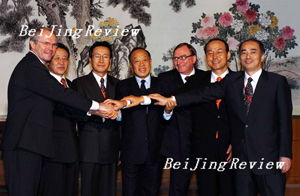
The tense security situation in Northeast Asia appears to have taken a favorable turn two weeks after the United Nations imposed sanctions on North Korea for its recent nuclear test.
China, North Korea and the United States agreed on October 31 that the long-stalled six-party talks aimed at getting North Korea to abandon its nuclear program would resume soon, at a time convenient for the participants, the Chinese Foreign Ministry said in a statement on its website.
At the invitation of China, the heads of delegations to the talks from the three countries held an informal meeting in Beijing on that date. The three heads reportedly had a "candid" and "in-depth" exchange of views on efforts to advance the talks.
Chinese Foreign Ministry Spokesman Liu Jianchao said on the same day that the most pressing task was the resumption of talks at an early date and the establishment of a nuclear weapon-free Korean Peninsula.
"The resumption of the talks is just the beginning of our efforts to ease the tension on the Korean Peninsula, and we would like to maintain consultations with the relevant parties during the process," Liu said.
The six-party talks, which involve China, the United States, Japan, Russia, North Korea and South Korea, have remained stalled since the last round of meetings in Beijing last November.
North Korea said it would not resume talks if the United States did not abandon its hostile attitude toward the country. The United States has also refused to have one-on-one discussions with North Korea, saying it would do so only under the multi-party framework.
On October 9, North Korea conducted an underground nuclear test, complicating the issue and putting the talks on the agenda again.
Welcome news
U.S. President George W. Bush said he would welcome North Korea's return to the talks. He also expressed thanks to China for its diplomatic campaign to get the discussions moving again.
But Bush said the agreement did not halt the U.S. effort to enforce the UN Security Council resolution passed in response to North Korea's nuclear test, which imposed an embargo on the sale of military and hi-tech material to North Korea.
Russia, for its part, termed the agreement to resume the talks "extremely positive."
"We are sincere in our hope that the talks will be resumed in the near future," Russian Deputy Foreign Minister Alexander Alexeyev said.
"The return of all sides to the six-party process and other details remain uncertain for the time being. It remains to be seen, though, how much time will be needed to arrange the meeting," he added.
Japan, South Korea and UN Secretary General Kofi Annan also hailed the announcement of the resumption of the six-party talks.
In a statement released by his spokesman, Annan said he hoped the talks can be reconvened soon, and that they will yield positive results leading to lower tensions in the region.
High hopes
The agreed-upon resumption of talks is one of the first signs of an easing of tensions since North Korea's nuclear test, experts said.
"It is encouraging that North Korea and the United States are set to return to the negotiating table," said Liu Jiangyong, an expert on the Korean nuclear issue at Tsinghua University.
U.S. Assistant Secretary of State Christopher Hill, who is also the chief U.S. negotiator for the six-party talks, said discussions could be resumed as early as this month or next.
The United States expects "substantial progress" from the next round of talks, Hill said at a press conference following a meeting with his North Korean counterpart Kim Gye Gwan, as well as a three-way meeting that included China.
Hill said North Korea made no explicit promises that it would conduct no further nuclear tests, and added that the UN Security Council Resolution on North Korea remained in force.
North Korea has set no conditions for returning to the talks, Hill said, but "wanted our reassurance that we would address the issue of the financial measures in the six-party process."
He said the United States has agreed to set up of a working group under the framework of the six-party talks to discuss the U.S. financial sanctions issue.
The United States imposed financial sanctions on North Korea last year, claiming that the latter was counterfeiting U.S. dollars.
Chinese observers believe the agreement to resume the six-party talks represents a concession on the part of both North Korea and the United States.
Pyongyang agreed to return to the negotiating table even though the United States has not lifted its financial sanctions, as North Korea has demanded, while the United States did not insist that the informal talks involve all six parties but agreed to attend the three-way talks first.
The topics will focus on whether the other parties can persuade North Korea to dismantle its nuclear weapons program and even how it may peacefully use their nuclear technology, since North Korea has already declared itself a nuclear power, Shi Yongming, a researcher on Northeast Asian studies at the China Institute of International Studies, told Beijing Review.
"It is very hopeful to reach some agreements or a basic framework on how to return to the joint statement signed by the six parties at the fourth round held in Beijing last September," he said.
All parties agreed in the joint statement on the goal and principles to realize a nuclear-free Korean Peninsula in a peaceful way.
"Of course, it will take time," Shi said, "but it is also very urgent and necessary. If nothing is achieved, the situation will become even more complicated, which is unfavorable to all parties."
Shi also commented that the agreement to resume the six-party talks would also have a positive effect on the Iranian nuclear issue.
| 